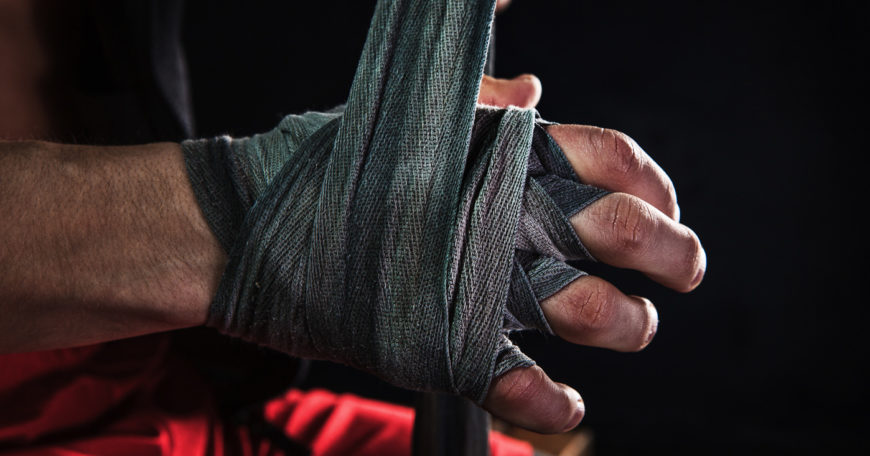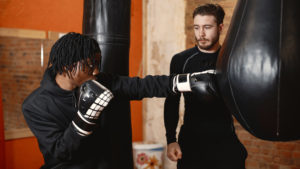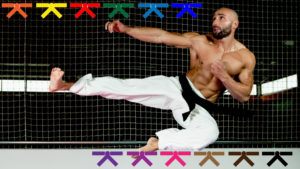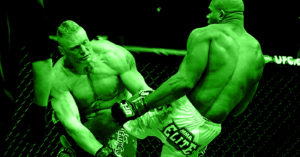Although rarely spoken about, most fighters, including those at an elite level, encounter pre-fight nerves. The biggest difference between an amateur and a professional (besides experience, of course) is how they deal with it. Feelings of self-doubt, fear, anxiety, and nervousness are completely normal, especially high-pressure situations, such as competitive sports. They exist as a survival mechanism, to anticipate and ultimately protect us from harm. Our brains will always seek comfort and safety, but ultimately, we must take control in these situations.
Combat sports are tricky because we know we are going into a situation that is more dangerous than an interview, or aptitude test, for example. But, it is a situation we have willingly chosen to be involved in and although the danger is not completely imagined, it is in a setting that is designed with the fighter’s safety as paramount. However, this knowledge alone does little to keep the elevated heart rate, stomach knots, and clammy hands at bay.
In fact, these reactions are considered a normal experience even during regular training. The majority of fighters get nervous when working with intimidating or more experienced training partners, and especially before sparring, when real danger, such as pain or injury is a possibility. But, because we work with new partners and spar regularly, we have learned to minimise that feeling, understanding that it is a necessity to overcome these natural emotions in order to progress our skills.

Conditioning then, is an important factor in helping us to deal with these feelings when they crop up. One of the big issues is that, if we are training competitively, we go to the gym every day, but the actual competition maybe once every 3 months, or perhaps only once or twice a year. We are not as conditioned to the heightened sense of nerves that occurs when getting in the ring to face an opponent.
Compare this to the Thais. In Thailand, children start training as young as five years old and can easily be paid fighters by 10. By the time they reach their late teens or early twenties they have already had hundreds of fights. Some athletes fight weekly, or at least a couple times a month. When you watch the Thais fight, they are calm, cool, and collected.
To them, it is a regular and consistent part of their lives. Another reason for their relaxed attitude towards fighting is that they place a lot less emphasis on fighting in general, including the result. They fight so often, losing is almost inevitable, and they are not attached to winning as much as we are in the West. Some days you win, some you lose. Here, we are too concerned with the outcome which adds more pressure to an already stressful event
Most Western fighters can never rack up even close to that number of fights without relocating to Thailand, but there are a few things every fighter can do to prepare for a fight that will lessen nerves and strengthen resolve:
In Training/ Before the Fight:
1- Visualization
Visualization is a technique that is used by athletes the world over, regardless of sport. This is an area that has been the subject of many research projects and the findings are incredibly transformative for competitive athletes. It is essentially a mental rehearsal of your performance.
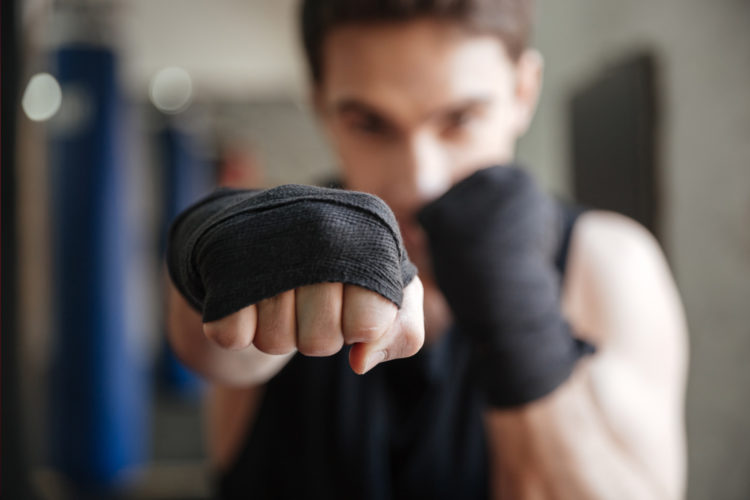
Rather than letting yourself imagine whatever comes to mind regarding your fight, visualization allows you to take control and give it a more structured direction. The reason why visualization is so effective is because it stimulates the same area of the brain as when you physically perform the action. In other words, your brain can’t tell the difference between imagined and real scenarios.
How to do it:
Begin to imagine every detail you can about the day of the fight. You can start with the beginning of the day or you can fast forward until you are at the fight venue. Think about how you’ll warm up and prepare for it, what the ring walk will feel like, and what you’ll do before you touch gloves to start the fight.
Then, imagine how you want the fight to go, how your opponent will react and how you’ll deal with that. Go through every round and rest break until finally feeling your hand being raised.
If possible, continue making it as real as possible, including who you’ll call or text after. What’s most important is to go into as much detail as possible, incorporating as many senses as you can, to make it as realistic as possible.
For best results, create a habit of visualization before training. A few minutes will suffice. Then when you have a competition, “run the tape”, just as you would before a regular training session. This will help to keep nerves at bay because it seems less like a completely unknown experience to your brain. It also helps to eliminate some of the unknowns, allowing you to predict and problem solve, thus making you more prepared for the eventualities of the fight. The more frequently you visualize, the better.
2- Affirmations
Affirmations are positive statements that are used to build self-esteem, by challenging and overriding negative beliefs and self-talk. By repeating positive affirmations about yourself, you gradually reprogram your brain into believing said statements. What we say to ourselves all day can have a huge impact on what we believe about ourselves, and in turn, what actions we take.
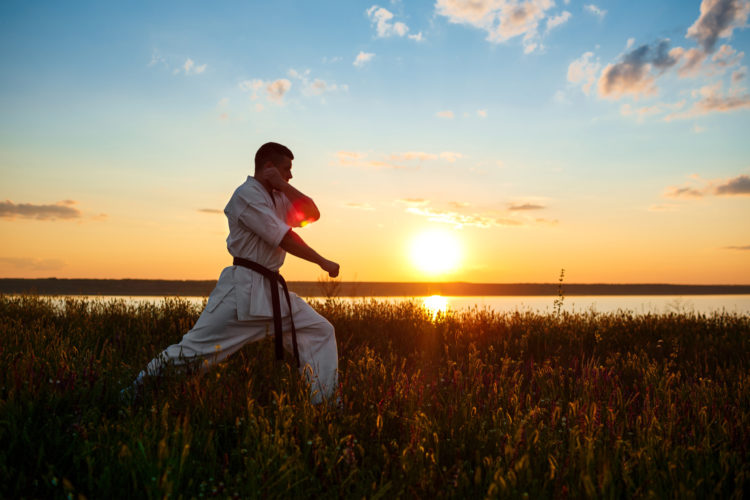
This is why it’s important for fighters to be aware of and have control over their thoughts in relation to their fighting abilities. Research has shown that spending just a few minutes a day thinking about your best qualities can not only reduce stress, but also increase your confidence, increasing the likelihood of a successful outcome.
How to do it:
Think about areas of your life or training that you would like to change your perspective on. What beliefs do you hold about your skills, potential and accomplishments? What words would you like to hear from a coach or more experienced fighter?
Write down your statements in a positive way, that boosts self-confidence and esteem. Make sure they are realistic and credible to you right now. They can always be adjusted later down the line. Write it in the present tense, eg. ‘I am strong. I am a skilled fighter. I am a winner’
Read or say your affirmation whenever you need a boost. Even better, incorporate it into your regular training, like during skipping or shadow rounds, to strengthen the effect.
3- Breathwork
Breathwork is another area that has been under the spotlight recently, especially in regards to sports performance. It has always been a pillar of yoga and meditation, but more recently, it has crossed over into the sports arena.
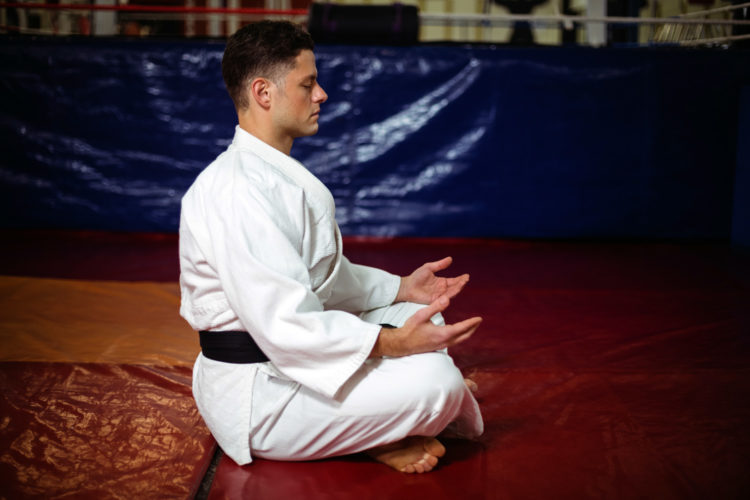
Breathing is an involuntary and unconscious function of the body, but it is also possible to make it voluntary and conscious. Controlled breathing triggers the parasympathetic nervous system, which allows us to counter the sympathetic nervous system (responsible for the fight or flight response), which helps to lower our heart rate, and reduce stress and anxiety levels.
Ideally, you establish a breathing practice before the day of the fight, however, a few deep breaths on fight day can help to reduce nerves as well aiding recovery inside the ring.
How to do it:
Sit upright on the floor or against a chair for support. Alternatively, you can lie down on your back. Inhale deeply through the nose, pulling the diaphragm down, expanding the stomach, ribs, and back. Hold briefly. Exhale through the mouth, pushing down through the abdomen, collapsing the chest and stomach inwards. Repeat at least 5 times.
There are also many signature breathing methods, and the 4-7-8 method, created by Andrew Weil, is an effective practice to use when you feel overwhelmed:
Start by emptying the lungs as much as possible. Then inhale through the nose for a count of 4. Hold for 7 seconds. Exhale through the mouth for 8 seconds. Repeat 4 times.
On the Day:
1- Music
Music can have a significant impact on our bodies. A fast tempo of music can make us feel energized, while a slower tempo can help us to relax. A body of research has shown that music around 60 beats per minute (bpm) can shift our brainwave to a more calm and relaxed state.

Since you won’t know the bpm of most music, pay attention to what songs or types of music relax you and create a playlist to listen to on the day of the fight before you have to warm up. Listening to a playlist of music that relaxes you, or makes you happy can have a tremendous effect on your wellbeing. Try to choose songs that are not too high tempo or would cause a spike in adrenaline.
Conversely, you can also create a high tempo playlist that you know will get you hyped up, perhaps during your shadow rounds or as you begin to warm up, to help get you “in the zone”.
2- Fuel
Eating and drinking appropriately can have a substantial effect on your mood. It’s important, especially if you are weight cutting, to refuel with whole foods as much as possible. Choose snacks or a meal that is carb-heavy, but will release energy slowly. Foods such as pasta, vegetables, berries, oats, and rice are all snacks that your body will burn slowly, fueling you with energy for a long period of time.
Try to avoid heavy meals or anything that may be hard to digest. This will definitely include fried and junk foods, but may also include dairy, gluten, and artificial sweeteners for others.
Hydration is a key component of feeling well on competition day. Drink plenty of fluids throughout the day, and if you have had to weight cut, add electrolyte tablets to replace any essential minerals that have been lost.
3- Rituals
Creating a fight day ritual can be a massive help in reducing unwanted anxiety. Many professionals have a set routine that they go through for every fight. Typically, it is done before or upon entering the ring/cage, but it can also be a series of habits that occur in the lead up to the event.
This helps in two ways. Firstly, it reduces stress by eliminating certain thought processes. Having a routine allows you to go through the motions without much thought needed. You won’t need to spend time figuring out the sequence of which to perform these methods, you already know what you’re doing.
Secondly, it provides a sense of security and comfortability. A routine is doing things that you already know and have already done a multitude of times. Having a ritual focuses your energy in a positive way and gives you greater control over your thoughts and actions, which will help to keep you calm.
Conclusion:
Nerves and anxiety are a natural response before a fight. It doesn’t matter that we have them, they are to be expected, what is important is how we deal with them. It’s Important not to feed into them too much or let them spiral out of control.
Like everything else you’ll do for your fight, it’s better to prepare well in advance. Dedicate time daily or weekly to visualization, repeating affirmations, or practicing breathwork, so that on the day, you are able to create a little bit of peace amidst the chaos.

